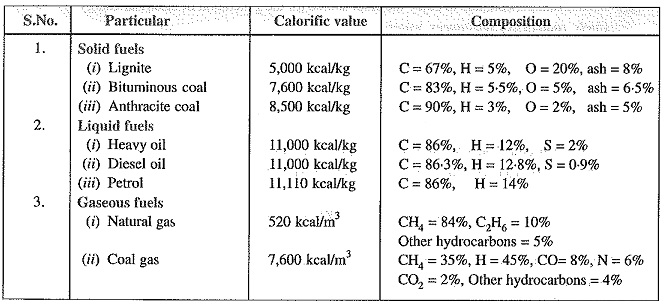Energy Efficiency Definition:
Energy Efficiency is available in various forms from different natural sources such as pressure head of water, chemical energy of fuels, nuclear energy of radioactive substances etc. All these forms of energy can be converted into electrical energy by the use of suitable arrangement. In this process of conversion, some energy is lost in the sense that it is converted to a form different from electrical energy. Therefore, the output energy is less than the input energy. Energy Efficiency Definition is given by
The output energy divided by the input energy is called energy efficiency or simply efficiency of the system.
As power is the rate of energy flow, therefore, Energy Efficiency Definition may be expressed equally well as output power divided by input power i.e.,
Define Calorific Value of Fuel:
The amount of heat produced by the complete combustion of a unit weight of fuel is known as its calorific value.
Calorific value indicates the amount of heat available from a fuel. The greater the calorific value of fuel, the larger is its ability to produce heat. In case of solid and liquid fuels, the calorific value is expressed in cal/gm or kcal/kg. However, in case of gaseous fuels, it is generally stated in cal/litre or kcal/litre. Below is given a table of various types of fuels and their calorific values along with composition.
Advantages of Liquid Fuels over Solid Fuels:
The following are the advantages of liquid fuels over the solid fuels :
- The handling of liquid fuels is easier and they require less storage space.
- The combustion of liquid fuels is uniform.
- The solid fuels have higher percentage of moisture and consequently they burn with great However, liquid fuels can be bumf with a fair degree of ease and attain high temperature very quickly compared to solid fuels.
- The waste product of solid fuels is a large quantity of ash and its disposal becomes a problem. However, liquid fuels leave no or very little ash after burning.
- The firing of liquid fuels can be easily controlled. This permits to meet the variation in load demand easily.
Advantages of Solid Fuels over Liquid Fuels:
The following are the advantages of solid fuels over the liquid fuels :
- In case of liquid fuels, there is a danger of explosion.
- Liquids fuels are costlier as compared to solid fuels.
- Sometimes liquid fuels give unpleasant odours during burning.
- Liquid fuels require special types of burners for burning.
- Liquid fuels pose problems in cold climates since the oil stored in the tanks is to be heated in order to avoid the stoppage of oil flow.


